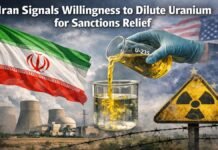
New Delhi: Amidst the intensifying conflict between Iran and Israel, experts warn that a potential blockade of the Strait of Hormuz by Iran could lead to a significant surge in global crude oil and LNG prices. The Strait of Hormuz, a critical maritime chokepoint, is the primary route through which countries like India import oil from major producers such as Saudi Arabia, Iraq, and the UAE.
A Critical Chokepoint Under Threat
In recent days, the situation has deteriorated, with Iran initiating drone and rocket attacks against Israeli targets. Israel has responded with missile strikes, raising concerns about further escalation. The Strait of Hormuz, a narrow 40-kilometer-wide sea passage between Oman and Iran, has become a focal point of the tensions.
Potential Economic Fallout
The ongoing hostilities have already pushed crude oil prices to approximately $90 per barrel. According to Motilal Oswal Financial Services, while diplomatic efforts are underway to de-escalate the situation, the closure of the Strait of Hormuz would sharply increase oil and LNG prices. The strait is a vital conduit for the global energy supply, with Saudi Arabia alone exporting 63 lakh barrels per day through this route.
India’s Energy Security at Risk
India’s energy imports are particularly vulnerable, as nearly all LNG exports from Qatar and the UAE, along with substantial crude oil shipments, pass through the Strait of Hormuz. With no viable alternative routes for these imports, India’s energy security hangs in the balance as the geopolitical crisis unfolds.

Global Implications
The Strait of Hormuz is not just crucial for India but is a key artery for the world’s oil trade, with a significant portion of global oil consumption passing through daily. Any disruption could have far-reaching consequences, affecting not only oil prices but also the broader global economy. As the situation develops, the international community watches closely, hoping for a resolution that ensures the uninterrupted flow of energy resources.




















































